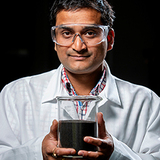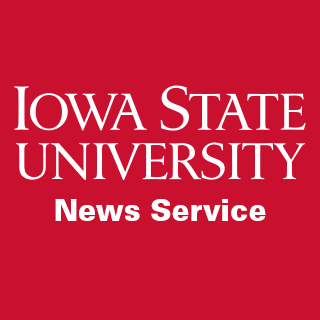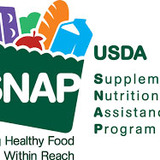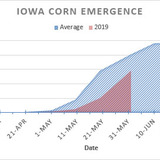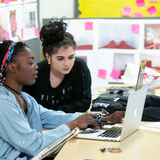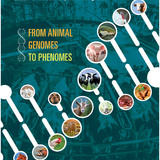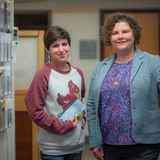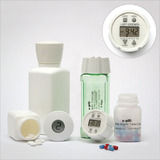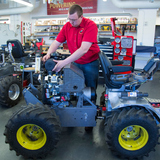News Archive
Monday, June 17 2019
-
Iowa State researchers studying slow-release fertilizer to feed crops, improve water quality
A research project looking for ways to add value to biochar may have found an unexpected application for the black power that's a co-product of thermochemically converting biomass to a liquid bio-oil. The researchers have found biochar could be a slow-release fertilizer that delivers nutrients to crops while keeping those nutrients from washing away in the rain or leaching into groundwater. More uses for biochar could make thermochemical biofuel production a more economically attractive technology.
-
Antioxidant puts up fight, but loses battle against toxic protein linked to Alzheimer’s disease
New research may explain why an antioxidant that protects the brain is also associated with deterioration in areas susceptible to Alzheimer’s disease. The antioxidant, superoxide dismutase or SOD1, improves cognition, but an Iowa State University research team found SOD1’s protective benefits dramatically weaken when levels of tau proteins – a hallmark of Alzheimer’s disease – increase.
-
Iowa State's Geetu Tuteja selected for Pew Scholars Biomedical Research Program
Geetu Tuteja, assistant professor in Iowa State's department of genetics, development and cell biology, has been selected to join the Pew Scholars Program in the Biomedical Sciences. She is the first Iowa State researcher to receive this honor. Tuteja is one of 22 promising scientists nationwide selected by the Philadelphia-based Pew Charitable Trusts to receive a four-year, $300,000 grant to conduct biomedical research aimed at advancing human health.
-
New economic study shows combination of SNAP and WIC improves food security
Forty million Americans, including 6.5 million children, are food insecure. Given the extent of food insecurity, a team of Iowa State University economists developed a methodology to analyze potential redundancies between two food assistance programs -- SNAP and WIC. Their research shows that participating in both programs compared to SNAP alone increases food security by at least 2 percentage points and potentially as much as 24 percentage points.
-
Iowa’s wet spring conforms with climate trends outlined in major 2018 assessment
Wet and cool weather throughout May delayed planting and slowed the emergence of crops, according to an ISU agronomist. The weather falls in line with trends outlined in last year’s National Climate Assessment, and slow emergence could remain a problem throughout the 2019 growing season.
-
ISU experts look at long-term impact of tariffs on supply chain, consumers
Businesses are preparing for the long-term impacts of the ongoing trade war between the U.S. and China. Consumers may not recognize the complexity and level of disruption created to points along the supply chain, but they are paying for it, say experts in Iowa State University’s Ivy College of Business. Cost is just one the consequences they expect to see in the fallout from the tariffs.
-
Not all teens turn to social media when they’re lonely
Technology is so pervasive it may seem as if teens spend more time on social networking sites than in real conversations with friends. New research challenges that assumption and finds some teens, especially when they feel lonely, prefer face-to-face interactions over social media.
-
Iowa State climbs in ranking of top 100 worldwide universities granted U.S. utility patents
Iowa State is tied for 69th in the world in the number of patents granted in the United States last year, according to a list released June 4 by the National Academy of Inventors and Intellectual Property Owners Association. The Iowa State University Research Foundation was granted 34 patents in 2018. ISU was ranked No. 83 in the previous year's ranking.
-
ISU students design proposals for new educational center in Iowa Judicial Building
As the Iowa Judicial Branch Building shifts from physical to digital files, Iowa State University students have designed proposals to turn the soon-to-be-vacant space into an experiential learning center for the public.
-
Iowa State University documentary 'Seeds! Diversity of Wonder' wins two prestigious Telly Awards
"Seeds: Diversity of Wonder," a six-part documentary film series about seed science, recently received a pair of Telly Awards. The film was produced by Manjit Misra, director of the ISU Seed Science Center. The documentary, which premiered at a film festival in March, takes viewers from the ISU campus and Iowa farms to locales in Africa and India.
-
A new vision for genomics in animal agriculture
Iowa State University animal scientists helped to form a blueprint to guide the next decade of animal genomics research. The recently released document outlines research priorities that will help livestock producers meet the protein needs of a growing global population. The blueprint calls for increased emphasis on how genomics interact with production methods and environmental factors to make livestock production a predictive science.
-
Changing the conversation about elective sterilization for women
Women and men have very different experiences talking with their doctors about elective sterilization. New Iowa State University research details the hurdles many women face and the sharp contrast in information provided for women and men. The researchers provide recommendations for doctors and patients on how to improve the conversation.
-
Doctors can estimate patient adherence by simply asking about medication routine
Doctors know patients do not always take their medications as prescribed. To help them stay on track, new Iowa State University research suggests doctors stop asking patients about missed pills and start asking about their routines.
-
Fresh off the assembly line: Power Pullers set to compete with newly built tractor
Iowa State University students will enter a quarter-scale tractor they designed and built into an international competition at the end of the month. The articulated, four-wheel-drive machine will compete in a range of categories, including performance, safety and manufacturability. The team also submits a written report and an oral presentation. The team hopes to improve on a fifth-place overall finish in last year’s competition.
